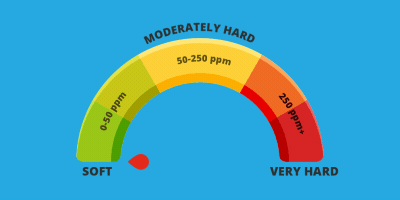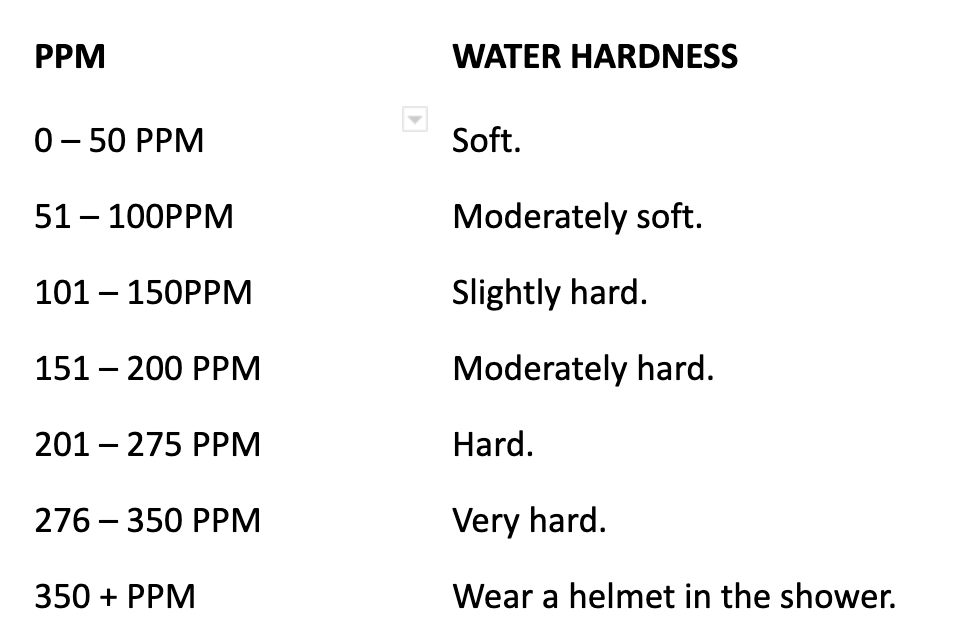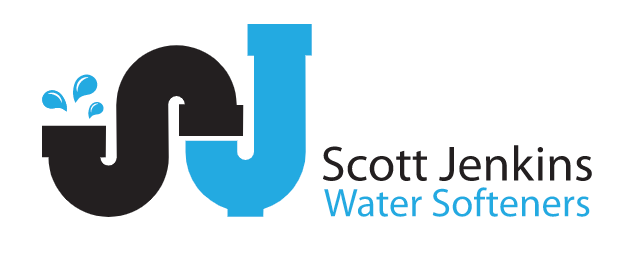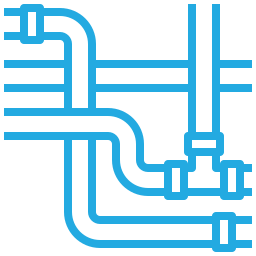How hard is the water in Hampshire?
Water hardness reading:
250 ppm (very hard)

The water in Hampshire tends to be hard. This is the reason
For as long as it has rained, Hampshire has been subject to hard water. And whilst the degree of hardness will differ from place to place across the county, it’s hard just about wherever you go. Generally, towns and villages throughout Hampshire register a water hardness reading that’s above 250ppm (parts per million). Anything over above 200ppm is considered hard.
The irony is that rainfall actually produces soft water. It’s when it comes into contact with the ground that things start to change. Hampshire has an abundance of clay and chalk in its underlying soil, which is full of minerals like magnesium and calcium. Once the rain drains into the sub-soil, these minerals get to work and transform soft water into the hard water you experience in your mains supply.
The most effective solution for countering hard water is to have a water softener fitted. Given the hardness of water in Hampshire, it’s little wonder that so many householders and businesses, such as hospitality and healthcare, have soft water systems installed. Water softeners are so effective that they reduce water hardness readings virtually back to zero ppm!
Hampshire – an Overview
Annual rainfall: 25inch or 640mm.
Wettest month – December 3.43inch or 87mm
Hampshire, or Hants, is on the England Channel coast and is the largest county in south-east England and the UK’s third biggest shire county. Whilst the county town is Winchester, Hampshire is actually named after Southampton, which, along with Portsmouth, are its two largest cities.
It is the largest county in South East England and remains the third largest shire county in the United Kingdom. An impressive 45 per cent of the county is made up of its two national park – the New Forest and South Downs.
With an economy based around maritime, agriculture and tourism, Hampshire enjoys consistently low unemployment rates – below the national average – and is considered to be one of the country’s most affluent regions. Apart from the iconic New Forest, Hampshire’s top tourist spots include its many seaside resorts, the National Motor Museum and the Southampton Boat Show. Great writers like Charles Dickens and Jane Austen resided in Hampshire and it ewas the birthplace of arguable the country’s greatest engineer, Isambard Kingdom Brunel.
Are you a Hampshire resident? Check out your local water hardness
Measuring the hardness of your water
The hardness of water is measured in particles per million (PPM), with the amount of hardness particles that are dissolved in the water rated, as follows:

Throughout Hampshire, the mains water supply is known for being hard or very hard.
How can I reduce the water hardness in my home?
If you want to avoid using hard water all the time, the best way of combatting its effects is to have a domestic or commercial water softener installed. However, if you would prefer to leave your drinking water unsoftened so that it is more palatable, then it is perfectly possible to filter out your drinking water supply from the rest of your softened mains supply.
What is the best water softener for me?
Our market-leading selection of Kinetico and EcoWater softeners are designed to suit all sizes of property and types of UK plumbing. We can discuss the best option for you, based on your budget and anticipated usage. Our ranges start from £1595 for the premium range and up.
The installation cost is £350 for all models connected to the most common 15-22ml pipework. For 28ml pipework, the price may go up to £450 but this will be assessed when we visit. There’s no need to do a site visit prior to installation – we can do both on the same day. The prices you see on the website are definitive and VAT inclusive.
If you are unsure about the right softener for you, by answering these few short questions you’ll be on the right track. Or call us if you have any questions.
Mains Drinking Water and Sewerage Services
The mains water and sewerage services for Hampshire are mainly delivered by Southern Water and Portsmouth Water.
What is the problem with hard water?
Like a naughty teenager, hard water can be a right pain! It isn’t that it is inherently bad. There are some good points. Let’s face it, a lot of people prefer drinking hard water as opposed to soft water. Nevertheless, for the majority of time, hard water is best avoided, if possible. Why? Well, much of it boils down to limescale.
When you boil or heat the water in your household appliances – such as the central heating boiler, dishwasher, washing machine and kettle – limescale build-up occurs. This is as a result of hard water molecules becoming agitated. Unfortunately, any time you cook, clean, wash and put on the heating, you risk encouraging limescale forming.
What are the common issues with limescale?
With constant hard water usage in your home, the scale will create any number of problems which, over time, will downgrade your household appliances and cost you money.
- Overall reduced efficiency of appliances
- Block valves, reduced diameter of pipework
- Potential for boiler breakdowns
- Increased gas and electricity bills
- Longer household cleaning times
- Poor appearance on surfaces like chrome, granite, glass, Perspex, etc
The effects of hard water on skin, hair and laundry
When it comes to our personal hygiene, hard water has a lot to answer for! You might think that lots of washing is a good thing – and it should be. But if you are continuously using hard water to keep yourself clean, it will dry out your skin. What’s more, it can be particularly bad for anyone who experiences skin conditions, like eczema psoriasis.
Meanwhile, despite the best efforts of shampoos and conditioners, it will be a struggle to keep your hair looking full-bodied and when the laundry comes out of the washing machine you may well notice how starchy it feels and drained of colour. That’s all caused by frequent exposure to hard water. The more you clean, the worse the problem becomes.
What is a water softener and how does it work?
A water softener attaches directly to the mains water supply. It works by flushing out the hard water particles, through a process known as “ion exchange” which removes the calcium and magnesium minerals that turn water hard in the first place. At SJ Water Softeners, the high-quality products we sell are filled with food-grade resin beads that are dosed with sodium ions. As the mains water passes through the softener’s tanks, the resin beads attract and then grab hold of the magnesium and calcium minerals and “exchange” them with sodium ions. It is this process which makes the water soft, thus eradicating any threat of limescale build-up.
Your softener will need to regularly “regenerate” to flush away the magnesium and calcium ions on the resin beads. The regularity of regeneration will depend on the amount of water you get through. To make life easy, a metering system tells the softener when to regenerate – and it does so automatically. All you have to do is make sure that your water softener is replenished with salt, which is required to assist with the regeneration process.
What does it cost to run a water softener?
Whilst the majority of the water softeners we fit don’t have many moving parts and are extremely reliable and highly unlikely to break down, there are associated servicing costs. For this reason, we would always recommend that you have a cost-effective Annual Health Check.
Typically, the only on-going cost you would need to consider is for block salt, for which you should allow anywhere between £2 and £7 per person per month. This will depend on the capacity and usage of your soft water system.










